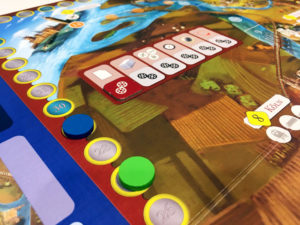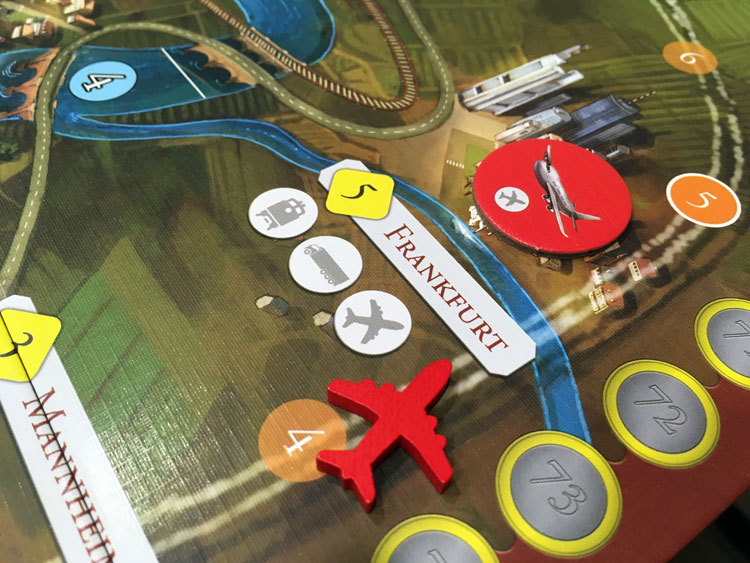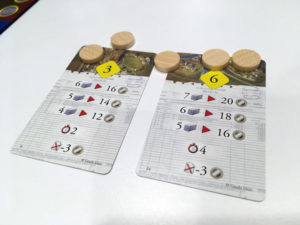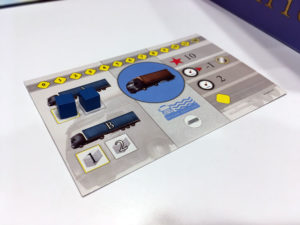 Gamers who have spent time stressing over the myriad shipping options on a board game order should take heart; their woes are not mere chaff for the game designers waste bin. Those stress inducing moments are now an opportunity for fun, in-game stress inducing moments. Maybe. The famed designers of ZhanGuo, Marco Canetta and Stefania Niccolini, are offering up a new delivery of potential fun.
Gamers who have spent time stressing over the myriad shipping options on a board game order should take heart; their woes are not mere chaff for the game designers waste bin. Those stress inducing moments are now an opportunity for fun, in-game stress inducing moments. Maybe. The famed designers of ZhanGuo, Marco Canetta and Stefania Niccolini, are offering up a new delivery of potential fun.
Rhein: River Trade is a pick-up-and-deliver game for 2-5 players that takes about 120 minutes. It plays best with 5 players.
Game Overview:
Rhein: River Trade is FedEx: The Game. Players take on the role of shipping companies aiming to fulfill contracts that require a certain amount of goods to be delivered to locations out of Basel, Germany within a certain amount of time. The player who manages this task to the achievement of the most profit wins.
Game Components:

A beautifully illustrated game board is the first thing gamers will notice upon opening the box. In addition, accurately shaped train, boat, and plane wooden miniatures appear as well, serving wonderfully against the backdrop of the game board art. Other components are fairly standard with wooden cubes representing containers to be delivered.
The rules, although they are straightforward and try to be comprehensive, seem to miss highlighting more than one question during play. They’re good overall, but it’s hard to find some answers in a wall of text.
How to Play:
Depending on the number of players, gameplay takes place over a set number of rounds. Each round has phases in which players will either make decisions or simply perform perfunctory actions. The phases are described below.
Take Orders – Players acquire order cards from a card row.
Load Goods – Players pay to place cubes onto transports they wish to use to deliver the goods to a certain city.
Reserve Transport Stops – For a cost, transports are told to stop at certain cities.
Move and Unload Transports – In a certain order, transports move. Goods delivered by one transport can be reloaded onto another transport.
Fulfill Orders – If there are enough of a player’s cubes in a city to fulfill a contract, the player receives the contract payout and removes the cubes.
End of the Round (reset) – Remaining transports without new destinations are reset.
After the appropriate series of rounds, the player with the most capital (money tracked similar to victory points) wins.

Game Experience:
If the pitch for Rhein: River Trade is FedEx: The Game, this reviewer is all in. The subject matter is extremely interesting given how many choices there are in global goods shipping. This theme ripe for interesting board games. However, Rhein: River Trade just barely makes it into the average range.
Any process of converting a business type or theme to a game must involve some considerations to gamify the subject matter and not simply try to offer a simulation of the subject. If it feels too much like work, it’s not a game. This is one of the issues with Rhein: River Trade.

The “work” comes across as a mechanical, empty process from round to round. Sure, there is revenue to be had and fulfilling orders on time gives players a slight sigh of relief, but few and far between are the tense moments. More often are the “oh, ok, you did that” moments. The dry nature to the play is really noticeable, even with eager anticipation of the game’s theme.
Other negatives only heighten the previous criticism. Low interaction means players are often left to figure out their own spreadsheet number crunching when taking contracts or choosing a transport. It’s possible to place goods on the same transport as another player to save costs, but only if the transport is stopping at the same location. Otherwise players will end up paying storage fees which can end up being the same cost as reserving a stop.

Even if players are really into the theme and mechanisms, the guesstimation it takes to tally a person’s points before the end game can also be difficult. Since turn order is determined by the player going last, it’s often difficult to change your on-hand money to get a better position for taking contracts. Couple this with the low interaction, and you really have a “get what you get” feeling to rounds.
This may also seem like a small issue, but when ending the game, the scoring is pretty straightforward. There aren’t any twists or additional columns to add to your spreadsheet. The right hand column is it.
Final Thoughts:
Gamers looking for a tight, tense game of high stakes delivery and out playing the competition for contracts should look elsewhere. Rhein: River Trade is as dry as a mummy’s hangnail. It works. It plods through phases as expectantly as an accountant running numbers. It just isn’t very much fun.
If you’d like to get a copy of Rhein: River Trade, you can pick it up for about $50.
Final Score: 2 Stars – It works. There are sparse interesting decisions. The dryness of the subject coupled with the often non-interactive nature of play really drags it down.
 Hits:
Hits:
• Interesting choices around managing cost
• Board illustration couples with wooden minis well
Misses:
• Low player interaction
• Lackluster game flow
• Victory positions difficult to calculate
• Ambiguous rules on movement























